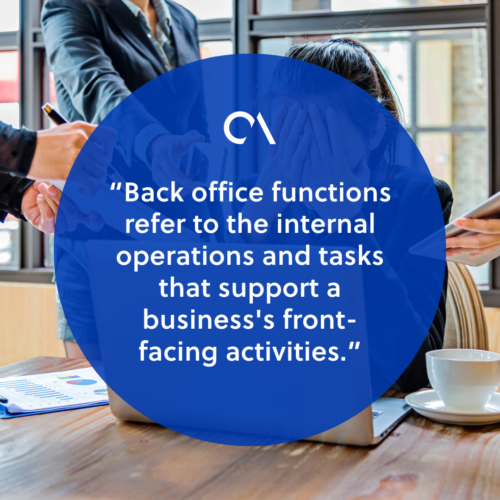Outsource back office functions vs. In-house: Insights from Acquire Intelligence

Are you torn between managing your back office operations in-house or outsourcing them to a third-party service provider? It’s a tough decision that many businesses grapple with.
On one hand, keeping these functions in-house gives you a sense of control and a personal touch. On the other hand, outsourcing can provide cost savings and specialized expertise.
Both options have their pros and cons, and it’s important to carefully weigh them before making a decision that could significantly impact your business.
In this article, we’ll compare and contrast these two different approaches so that you can determine what works best for your business.
What are back office functions?
Back office functions refer to the internal operations and tasks that support a business’s front-facing activities. These functions ensure that a company’s internal operations run smoothly and efficiently.
Some examples of back office functions include:
- Administrative tasks (e.g., data entry, record-keeping, and filing)
- Human resources functions (e.g., payroll processing, benefits administration, and compliance management)
- Accounting and finance tasks (e.g., bookkeeping, invoicing, and financial reporting)
- IT support and maintenance for internal systems and software
- Procurement and supply chain management (e.g., vendor management and inventory control)
These are crucial for the efficient functioning of a business, even though they may not be as visible to external stakeholders as front office operations.

Back office functions: Outsourcing vs. in-house
When deciding whether to outsource back office functions or manage them in-house, it’s crucial to weigh the pros and cons of each approach.
Here are some aspects to consider when choosing between the two strategies:
Cost consideration
According to Forbes, outsourcing can help businesses save up to 70% on employment costs.
Third-party service providers have lower overhead costs, allowing them to offer competitive pricing, particularly for tasks that do not require constant attention.
In contrast, managing these functions in-house may involve higher costs associated with hiring and training employees, investing in technology, and maintaining infrastructure.
Expertise and specialization
Outsourcing back office functions to specialized service providers can give businesses access to expertise that may not be available in-house.
These providers often have a deep understanding of industry best practices and can offer high-quality services that may be challenging for internal teams to match.
However, managing these functions in-house allows for greater control and customization. Internal employees have a better understanding of the company’s unique needs and processes.
Scalability and flexibility
Business process outsourcing can provide businesses with scalability and flexibility, allowing them to easily adjust the level of services based on demand fluctuations.
Service providers can quickly scale up or down resources as needed, giving companies the agility to respond to changing business requirements.
In comparison, managing these functions in-house may require businesses to invest in additional resources or personnel to accommodate growth or changes in workload.
Data security and confidentiality
One of the primary concerns with outsourcing back office functions is data security and confidentiality. Businesses must ensure that third-party service providers have robust security measures in place to protect sensitive information.
Managing these functions in-house can provide greater control over data security, as businesses can implement their own security protocols and guidelines. The drawback here is you’ll need to find your own security expertise.
Cultural alignment and communication
In-house back office functions may benefit from better cultural alignment and communication within the organization.
Employees are more familiar with the company’s values, mission, and goals, which can lead to greater integration of back office operations with overall business strategies.
Outsourcing these functions may introduce challenges related to aligning the service provider’s practices and communication styles with those of the business. But on a positive note, experienced firms are able to adjust to this quickly.
Compliance and regulation
Both administrative outsourcing and managing back office functions in-house require businesses to comply with relevant regulations and industry standards.
When outsourcing, it is important to select a service provider that adheres to all necessary regulations and maintains compliance. Outsourcing can reduce operational risks by leveraging the provider’s expertise and resources.
In-house functions provide more direct control over compliance efforts, allowing businesses to implement policies and procedures that align with legal requirements.
Focus on core competencies
Business process outsourcing for back office functions allows businesses to focus on strategic activities. Companies can allocate more resources to innovation, growth, and customer-facing activities.
While having them in-house gives you more direct oversight, it also diverts attention from core business objectives.

Why choose Acquire Intelligence
Acquire Intelligence (formerly Acquire BPO) is the ideal partner for outsourcing back office functions. With a strong focus on leveraging the best technology and skilled resources, its comprehensive and co-sourcing models offer bespoke solutions that exceed client expectations.
By harnessing its expertise in back office solutions and automation technology, Acquire Intelligence can significantly boost customer experience and process efficiencies. Its impressive track record and testimonials from satisfied clients demonstrates its ability to drive success.
Choose Acquire Intelligence as your partner for outsourced back office functions and ensure that your organization is well-positioned for long-term success.







 Independent
Independent




